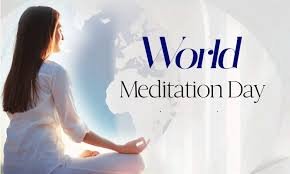UNGA Declares December 21 as World Meditation Day
Introduction to the Declaration
The United Nations General Assembly (UNGA) has declared December 21 as World Meditation Day, recognizing the growing importance of meditation in promoting global peace and well-being. This declaration, adopted by the UNGA, seeks to highlight the significance of meditation in fostering mental health, enhancing focus, and supporting personal growth. The move is part of a larger global effort to prioritize wellness and mindfulness practices as tools for promoting peace and understanding among nations.
Key Objective of World Meditation Day
The primary aim of World Meditation Day is to create global awareness about the benefits of meditation. With growing concerns over mental health issues, such as anxiety and stress, meditation has been recognized as an effective tool for calming the mind and improving emotional resilience. This day encourages individuals, organizations, and governments to engage in meditation practices, promoting peace and mental well-being across all communities.
Support for Mental Health and Well-being
The UNGA’s declaration comes at a time when mental health challenges are at an all-time high globally. Mental health awareness and advocacy have gained momentum in recent years, with a special focus on combating stress, anxiety, and depression. By dedicating a specific day to meditation, the UNGA aims to inspire people worldwide to adopt meditation practices that can contribute to healthier, more peaceful lives.
Role of Meditation in Global Peace
Meditation is often associated with spiritual practices, but its benefits go beyond that. It is now recognized as a tool that can transcend cultural and national boundaries, bringing people together to achieve peace and tranquility. As conflicts and tensions persist around the world, the universal practice of meditation provides a non-violent way to foster global peace, empathy, and mutual respect.

Why This News is Important: The Global Impact of Meditation
Promotion of Global Wellness
The declaration of December 21 as World Meditation Day is an important global initiative that promotes physical and mental wellness. Meditation is known for its calming effects, and its practice has been linked to improved focus, stress reduction, and overall mental health. By dedicating a day to meditation, the UNGA sends a clear message about the importance of mental health on a global scale.
Encouragement for Governments and Organizations
The declaration urges governments and organizations to prioritize mental health in their public policies and initiatives. By supporting the practice of meditation, institutions can contribute to a more peaceful and healthier society. Governments are encouraged to provide resources, programs, and awareness campaigns that focus on the importance of meditation in stress relief and mental well-being.
Enhanced Peace and Unity Worldwide
This initiative fosters global peace by encouraging individuals worldwide to take a moment of mindfulness. Meditation offers a space for reflection, introspection, and harmony, which are essential in overcoming divisions and conflicts. In a world where tensions often arise, the practice of meditation can create an atmosphere of unity, bringing people together to work toward shared goals of peace and understanding.
Historical Context: Meditation and Its Global Recognition
Ancient Roots of Meditation
Meditation has been practiced for thousands of years, with origins in ancient spiritual traditions, including Hinduism, Buddhism, and Taoism. It was historically used as a tool for deepening spiritual understanding and connection with the divine. Over the centuries, the practice spread across different cultures and regions, evolving into various forms of mindfulness, concentration, and relaxation techniques.
Modern Revival of Meditation Practices
In the 20th century, meditation gained popularity in the West, particularly in the context of self-improvement, stress management, and psychological well-being. The rise of mindfulness-based practices such as Mindfulness-Based Stress Reduction (MBSR) led to a broader acceptance of meditation in the medical and scientific communities. Studies began showing that regular meditation can reduce stress, improve mental clarity, and enhance emotional regulation.
UN’s Recognition of Meditation for Global Peace
The United Nations has long been an advocate for mental health and peace initiatives. This declaration is part of a larger effort by the UN to support global wellness through initiatives such as the International Day of Peace and the promotion of Sustainable Development Goal (SDG) 3, which emphasizes good health and well-being for all. By recognizing World Meditation Day, the UN highlights the importance of mental health in fostering peace and unity worldwide.
Key Takeaways from “UNGA Declares December 21 as World Meditation Day”
| S. No. | Key Takeaway |
|---|---|
| 1 | UNGA has declared December 21 as World Meditation Day to promote mental health and global peace. |
| 2 | The primary objective is to raise awareness about meditation’s benefits in enhancing emotional resilience and mental well-being. |
| 3 | Meditation is recognized as a tool for global peace, encouraging unity and empathy across nations. |
| 4 | The declaration urges governments and organizations to prioritize mental health initiatives, including the promotion of meditation. |
| 5 | The move supports the UN’s ongoing efforts to advocate for mental wellness and peace through initiatives aligned with the Sustainable Development Goals (SDGs). |
Important FAQs for Students from this News
1. What is World Meditation Day?
- World Meditation Day, declared by the UNGA, is an annual observance on December 21 aimed at raising awareness about the mental and emotional benefits of meditation, focusing on its role in global peace and well-being.
2. Why did the UNGA declare December 21 as World Meditation Day?
- The UNGA declared this day to highlight meditation’s importance in promoting mental health, reducing stress, and fostering global peace. The move also seeks to encourage individuals and governments worldwide to adopt meditation practices.
3. How does meditation contribute to global peace?
- Meditation promotes inner peace, mindfulness, and empathy, which can help reduce conflict and division. By fostering a shared practice of calmness and reflection, meditation encourages unity and understanding between nations and individuals.
4. What are the benefits of meditation?
- Meditation offers various benefits, including stress reduction, improved mental clarity, enhanced focus, emotional balance, and better physical health. It is particularly effective in managing anxiety and depression, contributing to overall well-being.
5. How can governments support World Meditation Day?
- Governments can support World Meditation Day by promoting meditation programs, allocating resources for mental health initiatives, and organizing public awareness campaigns about the importance of meditation for personal and collective well-being.
Some Important Current Affairs Links














